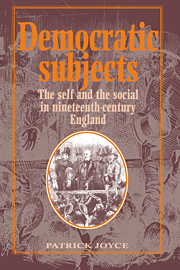Book contents
- Frontmatter
- Contents
- List of plates
- Acknowledgements
- Introduction
- Part One The sorrows of Edwin Waugh: a study in ‘working-class’ identity
- Part Two John Bright and the English people: a study in ‘middle-class’ identity
- Part Three Democratic romances: narrative as collective identity in nineteenth-century England
- 12 Narrative and history
- 13 The romance of improvement
- 14 The aesthetic framing of the social
- 15 The constitution as an English Eden
- 16 The story of the cruel Turk
- 17 Some democratic leading men, or Mr Gladstone's dream
- Appendices
- Index
17 - Some democratic leading men, or Mr Gladstone's dream
Published online by Cambridge University Press: 10 December 2009
- Frontmatter
- Contents
- List of plates
- Acknowledgements
- Introduction
- Part One The sorrows of Edwin Waugh: a study in ‘working-class’ identity
- Part Two John Bright and the English people: a study in ‘middle-class’ identity
- Part Three Democratic romances: narrative as collective identity in nineteenth-century England
- 12 Narrative and history
- 13 The romance of improvement
- 14 The aesthetic framing of the social
- 15 The constitution as an English Eden
- 16 The story of the cruel Turk
- 17 Some democratic leading men, or Mr Gladstone's dream
- Appendices
- Index
Summary
The role of political leaders in enunciating narratives, and the fact that such leaders were also characters within narratives, is evident. At this time political leaders were very important in conveying and enacting narratives simply because the role of leadership was more significant than it was later to be. From 1860 into the 1890s political organisation was of growing, but still limited, importance. This, together with the strong tendency to disunity in these early manifestations of party – particularly in Liberalism – meant it was essential that issues, ideas, and activities be personalised, and dramatised, in the figure of the leader.
There was a good array of leadership styles, at both national and local level, each of them playing out different narratives, and enacting different aspects of democracy. There were, for instance, the just, benevolent employer, the representative of local interests, the sporting hero, the man of bonhomie, all particularly telling on a local level. On a national level, a very different proposition from the moralism so far considered, Palmerston as the aristocratic roué had a considerable following among working men, in London especially. His brand of ‘Lord Cupid’ in private affairs, and ultra-patriotic defender of liberty in public ones, offered a metropolitan contrast to the moral style so effective in provincial England and the rest of Britain.
- Type
- Chapter
- Information
- Democratic SubjectsThe Self and the Social in Nineteenth-Century England, pp. 213 - 224Publisher: Cambridge University PressPrint publication year: 1994



